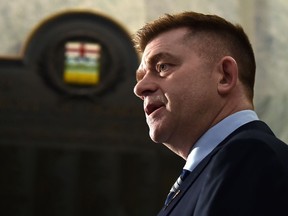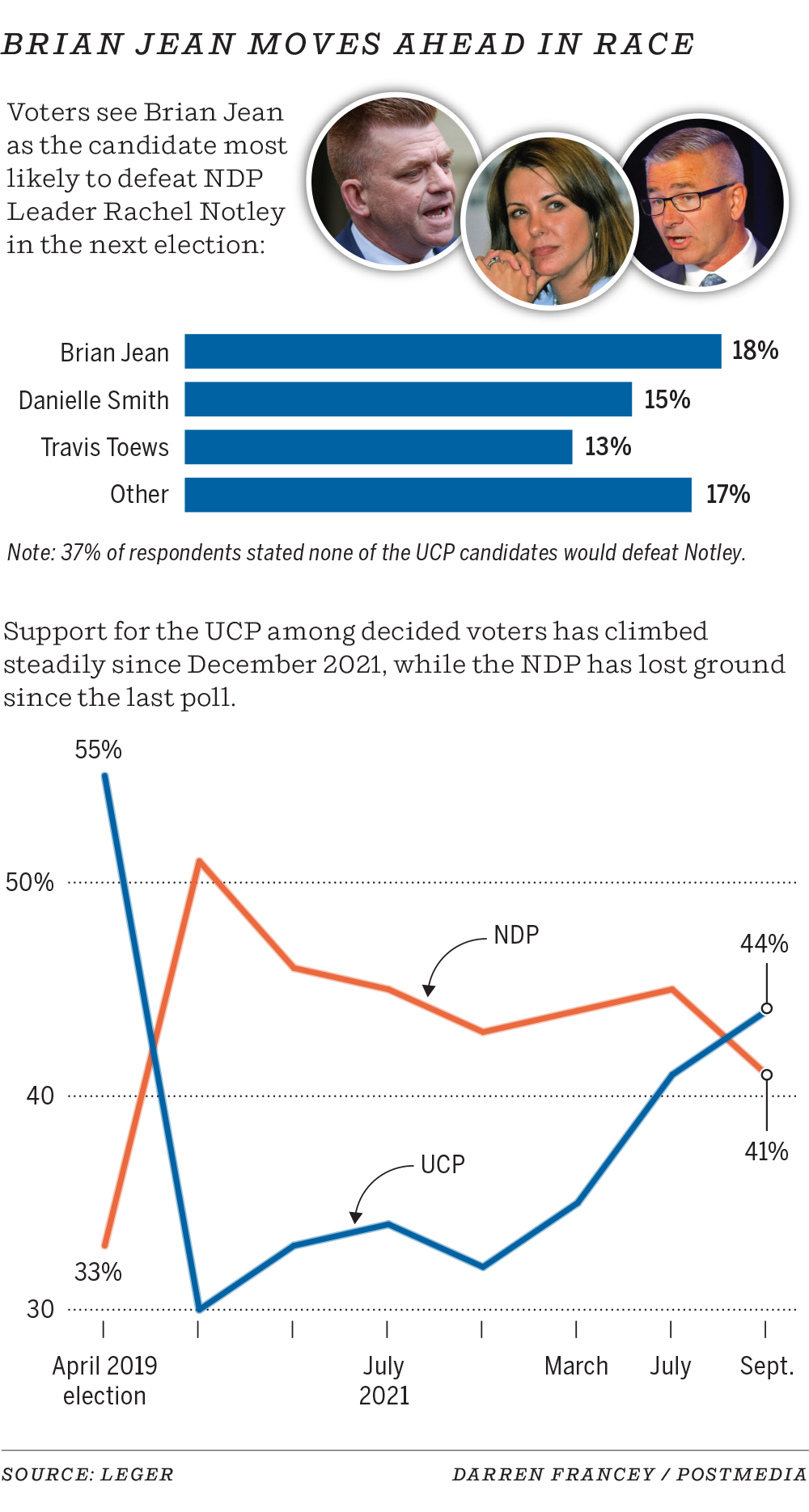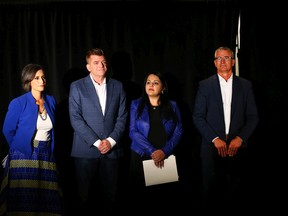The UCP's fortunes have been buoyed by a slew of good news, from the perception of a receding pandemic to a $13.2-billion surplus
Author of the article: Bill Kaufmann
Calgary Herald
Publishing date: Sep 09, 2022 •
Publishing date: Sep 09, 2022 •

Brian Jean speaks to the media after being sworn in as an MLA on April 7, 2022, at the Alberta legislature in Edmonton.
PHOTO BY ED KAISER /Postmedia file
If a provincial election were held today, the UCP would narrowly defeat the NDP, according to a new poll.
And the survey suggests that among the ruling party’s supporters, though not necessarily card-carrying members, Brian Jean would win the UCP leadership race and is considered most likely to defeat Rachel Notley’s NDP next spring.
If a provincial election were held today, the UCP would narrowly defeat the NDP, according to a new poll.
And the survey suggests that among the ruling party’s supporters, though not necessarily card-carrying members, Brian Jean would win the UCP leadership race and is considered most likely to defeat Rachel Notley’s NDP next spring.
The online Leger poll of 1,006 conducted Sept. 1-5 shows the UCP under outgoing premier Jason Kenney would capture 44 per cent of total committed voters versus 41 per cent for the Opposition NDP, according to the poll.
That dovetails with other polls in recent months showing rising support for the UCP.
It also shows UCP backbencher Jean, who’s vying for the party’s leadership against six rivals, would narrowly top that field among the party’s supporters and edges out Danielle Smith, former Wildrose Party leader and presumptive front-runner, as most capable of going on to win the 2023 general election.
The UCP’s fortunes have been buoyed by good news, from the perception of a receding pandemic to an economic resurgence capped by the announcement of a $13.2-billion government surplus driven by ballooning energy revenues, said Leger executive vice-president Ian Large.
RECOMMENDED FROM EDITORIAL
“It’s been a steady uptick for the UCP. We saw a big jump first in March, then in July,” he said.
“This trend is clearly heading in the right direction for the UCP … . People don’t like change when things are going well.”
The poll shows a continuation of NDP strength in Edmonton, with the party capturing 52 per cent of the vote versus 33 per cent for the UCP.

But in Calgary, the governing party leads the NDP by 44 per cent to 38 per cent. The UCP leads in the rest of the province 53 per cent to 32 per cent for the NDP.
Large said while the momentum has been on the UCP’s side, that could change dramatically depending on the fallout from the party’s leadership race, with a winner to be revealed Oct. 6.
Divisions within the party, a potentially unpopular leadership choice and policies like candidate Smith’s Alberta Sovereignty Act could swing public opinion at a crucial time, he said.
“If the leadership race produces anything controversial, that’s going to affect the support the UCP’s got,” said Large.
Mount Royal University political science professor Duane Bratt agrees. Next spring’s election will once again hinge on Calgary, where a Smith premiership would prove problematic for the UCP, he said.
“What the poll does show is a generic conservative would do quite well, but once you put a name to that it gets harder,” he said.
“Smith would be toxic in Calgary and the NDP would pick up a lot of seats.”
When asked about the poll’s significance on Thursday, UCP leadership hopeful Travis Toews said it shores up a trend in public opinion but that adopting rival Smith’s proposed Alberta Sovereignty Act puts that position in jeopardy.
“I have a deep concern about that because I believe the Conservative party holds by far and away the best solutions for the province going forward,” he said.
“Don’t take that for granted — we have to work hard, we have to be Albertans’ best choice … but we can’t take policy positions that ultimately undermine our economic and fiscal and political strength, positions that simply won’t be acceptable to the majority of Albertans.”
The Alberta Sovereignty Act would enable Alberta to ignore federal laws deemed to be against the province’s interests.

UCP leadership candidates (left to right) Leela Aheer,
Brian Jean, Rajan Sawhney and Travis Toews at yesterday’s press conference.
Jim Wells/Postmedia
On Thursday, UCP leadership rivals Toews, Jean, Leela Aheer and Rajan Sawhney gathered in Calgary to denounce the act as ineffective and a threat to the party’s unity and electoral fortunes.
The UCP government could face another minefield if Smith wins the leadership and pushes the Sovereignty Act, said Bratt.
“What if Smith is defeated (in the legislature) on the Sovereignty Act and we go to the polls early?” he said. “I don’t know how she can backtrack from (the act).”
The poll shows Jean would narrowly lead the UCP leadership vote across multiple ballots and 18 per cent — a slim plurality — believe he’d be best positioned to defeat the NDP, just ahead of Smith at 15 per cent.
Large emphasized those polled are UCP supporters and not necessarily party members eligible to cast leadership ballots.
But he said the result could be an indication presumptive front-runner Smith faces “a much tighter race than people are expecting.”
Bratt said the poll’s take on the leadership race is skewed away from where most of the party’s voting members reside, in the rural areas, and thus isn’t reliable.
But it does indicate Jean’s strength among party supporters beyond that smaller base, he added.
Bratt expects Smith to top the first ballot, but after that, it’s a toss-up, “because her growth ability after that is quite small.
“Where do Jean supporters go (on subsequent ballots) — to Toews or Smith? We simply don’t know.”
As a non-random online survey, a margin of error wasn’t reported but if the poll had used random sampling, its margin of error would have been plus or minus 3.1 per cent, 19 times out of 20, says Leger.
BKaufmann@postmedia.com
Twitter: @BillKaufmannjrn
On Thursday, UCP leadership rivals Toews, Jean, Leela Aheer and Rajan Sawhney gathered in Calgary to denounce the act as ineffective and a threat to the party’s unity and electoral fortunes.
The UCP government could face another minefield if Smith wins the leadership and pushes the Sovereignty Act, said Bratt.
“What if Smith is defeated (in the legislature) on the Sovereignty Act and we go to the polls early?” he said. “I don’t know how she can backtrack from (the act).”
The poll shows Jean would narrowly lead the UCP leadership vote across multiple ballots and 18 per cent — a slim plurality — believe he’d be best positioned to defeat the NDP, just ahead of Smith at 15 per cent.
Large emphasized those polled are UCP supporters and not necessarily party members eligible to cast leadership ballots.
But he said the result could be an indication presumptive front-runner Smith faces “a much tighter race than people are expecting.”
Bratt said the poll’s take on the leadership race is skewed away from where most of the party’s voting members reside, in the rural areas, and thus isn’t reliable.
But it does indicate Jean’s strength among party supporters beyond that smaller base, he added.
Bratt expects Smith to top the first ballot, but after that, it’s a toss-up, “because her growth ability after that is quite small.
“Where do Jean supporters go (on subsequent ballots) — to Toews or Smith? We simply don’t know.”
As a non-random online survey, a margin of error wasn’t reported but if the poll had used random sampling, its margin of error would have been plus or minus 3.1 per cent, 19 times out of 20, says Leger.
BKaufmann@postmedia.com
Twitter: @BillKaufmannjrn

No comments:
Post a Comment